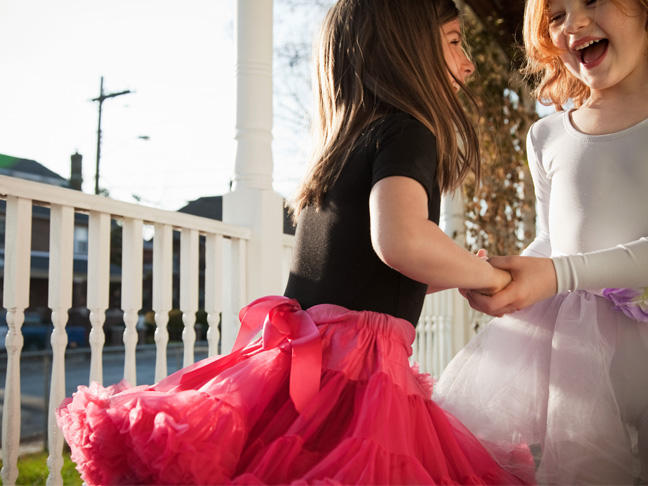Then, as if the world was playing some sort of cosmic joke on me, I gave birth to a lovely little girl who just so happens to love (love love) pink. The moment I realized she was “a pink girl” panic set in. How could it be?! Initially, I tried to steer her towards a rainbow of other colors, decorating her room in orange and white, telling her how pretty she looked in blue… but she knows what she likes. She likes pink.
I’m not the first mother to deal with this dilemma. The color pink is getting a lot of press these days. Recently, The New York Times ran a story on the popularity of Nerf Rebelle weapons, with the headline: Today’s Girls Love Pink Bows as Playthings, but These Shoot. Writer Yael Kohen riffed on the topic in What’s The Problem with Pink, Anyway? There have been various parenting books on the subject and NPR surveyed the history of pink in Girls Are Taught To Think Pink But That Wasn’t Always So.
For me, the real eye-opener occurred several years ago when I saw photographer JeongMee Yoon’s The Pink Project. Yoon took pictures of her own daughter and other little girls with their enormous collections of pink. At that point, my aversion turned to anger. I suddenly felt girls were being brainwashed, stereotyped, and mass marketed in a potentially damaging way.
After doing some research, I discovered pink mania only surfaced in the last 50 years. Once toy companies picked up on the power of pink, there was no stopping it. At first, there were pink princesses, ponies, fairies, unicorns, bunnies, and Barbies. Then diaries, desks, bedding, sunglasses, and sports gear. Today, you can get anything in pink, from a telescope to an air rifle, even a Red Sox (RED, people!) baseball jersey. Iconic brands like John Deere, Fender, and Lincoln Logs have gone pink because it sells — and for companies like Nerf, Zing, and Lego, it sells big.
I recently came across PinkStinks, a movement started by two sisters who were fed up with the way girls were being force-fed pink. On their website, they state: “Girls’ products overwhelmingly focus on being pretty, passive, and obsessed with shopping, fashion, and makeup — this promotes a dangerously narrow definition of what it means to be a girl. These ‘Girly’ products and concepts are marketed, for the most part, under the umbrella of pink. Pink has become the ubiquitous brand colour to represent modern girlhood. This restrictive conditioning and colour-coding rears its ugly head from the moment a girl is born and continues into adulthood — with repercussions for both sexes.”
I cheered when I read this — it gave me hope. I can feel the tide turning. Companies are getting the message that there’s more to girls than pink, and in part we have Katniss Everdeen to thank for it. The Hunger Games heroine has singlehandedly changed the way companies think about girls. Go, Katniss! Moms are breaking the mold too — the archetypal feminine housewife of old has been replaced with a strong, athletic, modern mom. Go, us!
Still, the pink aisle at Target isn’t going away anytime soon and that’s fine with me. Trashing pink and those who genuinely like it is just as bad as forcing it on kids. I no longer grab the shopping cart and run when my daughter picks something pink off the store shelf. As long as she’s not letting it define her, I’m okay with it. Her favorite hue is a hip, happy fuschia that I actually — dare I say it? — I actually like. I even bought a dark pink cardigan for myself! My panic has subsided and, slowly but surely, I’m opening up to pink. After all, I am a girl and girls like pink, right?
